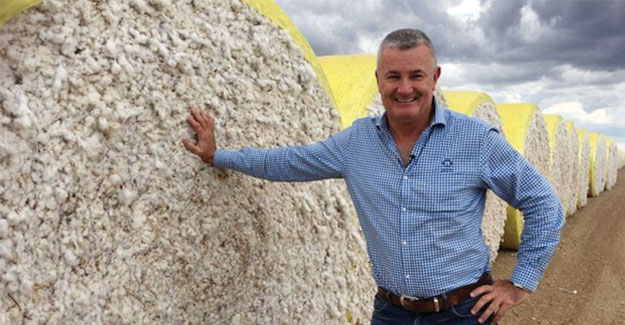
Australian Cotton Preferred For Being More Sustainable
Consumer desire for sustainably produced goods is driving domestic and global demand for Australia's US$ 2.5-billion cotton crop, according to retailers and millers Leading brands are now introducing clothing ranges made entirely from Australian cotton as an alternative to cheaper fibre mixes. "More and more international retailers and brand owners want to know the story about the production cycle," Cotton Australia CEO Adam Kay said. "They want to know about the sustainability and the environmental story," he said, adding the industry had worked hard for years on winning a social license to operate. "We use less land to produce more fibre than anywhere else in the world, and we're also the most water-use efficient cotton producer globally. We can clearly demonstrate over 40% improvement in water use efficiency over the last decade and we've reduced the amount of pesticide used by 90% in the last 15 years." Kay recently hosted a visit to the cotton fields of Narrabri, New South Wales, for designers and retailers from some of the biggest brands in the country. "We've seen a huge increase in interest," said Cotton Australia's Brooke Summers, whose job is to sell the story of Australian cotton to the world. "A couple of years ago we struggled to get even eight people on a plane out to a visit like this, and now we've got thirty people here today." For Lisa Hunter, who manages womenswear for Jeans West, the tour gave her a feel - quite literally - of the fibre in the field, as well as an insight into the ginning process and the research being carried out to continually improve the crop. "Environmental credentials are incredibly important to our customers," Hunter said. "So we've been working transparently trying to trace back the cotton to the region and to the farm." The jeans retailer will feature its first all-Australian cotton shirts this spring. Discount chain Kmart only months ago launched a 100% Australian cotton T-shirt range, following the introduction of a home-grown cotton menswear range at its sister retailer, Target. While Australian cotton usually cost more than its competitors, that did not appear to be a turn-off for customers who wanted a high-quality product, retailers said. "It's generally a longer stapled yarn and is worldwide known for its durability," said Target's Neil Ainsworth. "We're starting to see Australian brands and retailers recognise that Australian people want to buy Australian-grown," Kay said. Overseas buyers are also cottoning-on to the value of the Australian-grown fibre, according to the vice-president of the Thai Cotton Manufacturing Association, Kumjorn Chuenchoochit. He said his European and Japanese customers were demanding not only sustainably produced cotton, but fibre which could be traced back to the field where it was grown, as is the case in Australia. "I personally have been using Australian cotton for the past 25 years and so I come here every year and you can see the quality of the cotton here getting better and better," he said. "The people in the cotton industry here are environmentally conscious, they are doing everything they can to protect the environment - this is also very important to us." Australia once rode on the sheep's back and now, the annual cotton harvest is about three times the wool clip. "The Australian crop this year is going to be about a million tonnes and we'd estimate that that would put a shirt, jeans, jocks and socks on about 500 million people, so a half a billion people will be clothed by our industry this year ," Kay said.
Textile Excellence
If you wish to Subscribe to Textile Excellence Print Edition, kindly fill in the below form and we shall get back to you with details.













